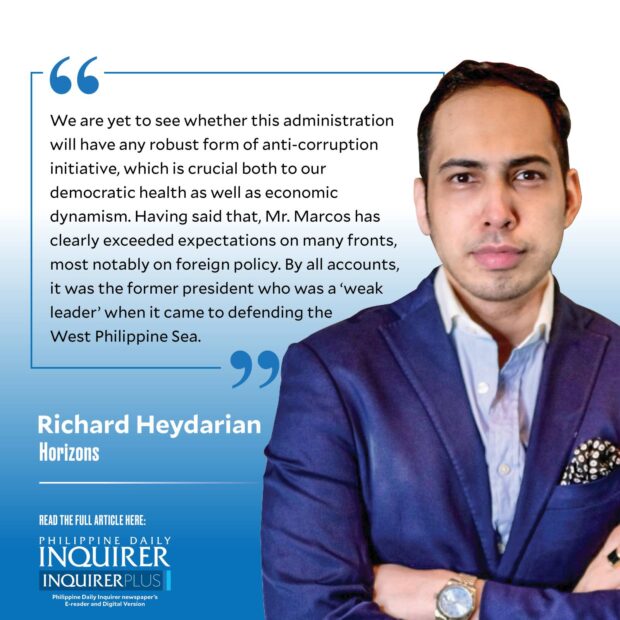Marcos: Not so ‘weak leader’ after all
 Perched at the very center, flanked by a legion of national and local politicos eager to make their mark, he remained cool and composed. Although there were hints of exhaustion, he remained focused throughout the hour-long briefing. Though the nation’s most powerful man, he acted more like a school principal—gently listening to the counsel of various officials in attendance.
Perched at the very center, flanked by a legion of national and local politicos eager to make their mark, he remained cool and composed. Although there were hints of exhaustion, he remained focused throughout the hour-long briefing. Though the nation’s most powerful man, he acted more like a school principal—gently listening to the counsel of various officials in attendance.
Far from a domineering patriarch, President Marcos gently moderated back-and-forth exchanges among those in attendance. The occasion was a very public “situation briefing” among multiple stakeholders on the persistent flooding crisis in Pampanga. He kept his cool, politely directing questions and seeking clarification from various quarters.
And then, all of a sudden, the temperature in the room rose to a boiling point. Former public works secretary Rogelio Singson’s proposal for a water impounding system, similar to his water cistern project at Fort Bonifacio in Taguig City, was met with vehement opposition from the local politico.
Article continues after this advertisement“We will not allow the impounding of Candaba Swamp … If you want a security problem, go ahead and ruin the livelihoods of all the farmers in Candaba. We will walk out from here,” Pampanga Rep. Anna York Bondoc said, clearly asserting her authority as a local government leader.
At this point, however, Mr. Marcos immediately stepped in. He firmly, yet politely, explained the science as well as economics behind Singson’s proposal. He also reassured his local government counterpart that “[w]e have no interest in destroying the livelihoods of our farmers [in Candaba]. We will not leave them behind …”
Instead of engaging in populist antics or bullying subaltern politicos to please his ego or base, he pellucidly explained the rationale behind the proposal of Singson, who served as former president Benigno Aquino III’s infrastructure czar. In barely a single minute, he also evinced a respectable degree of familiarity with the fundamentals of environmental science, which clearly took some in the audience by surprise. At once, he was both presidential and authoritative.
Article continues after this advertisementThe curious episode was refreshingly revealing. It stood in stark contrast to preconceptions about Mr. Marcos prior to his assumption of power. Forget about the whole host of sensational rumors—and, at times, slanderous comments—circulating among his supposedly progressive critics. No less than former president Rodrigo Duterte, in a thinly veiled public rant, tried to justify his refusal to endorse Mr. Marcos in last year’s elections: “I am not impressed by him. He is really a weak leader.”
In fairness, Mr. Marcos’ tenure, so far, can be credibly criticized for a whole package of gaffes. From trafficking in historical distortion to multimillion “rebranding” projects and a multibillion Maharlika sovereign wealth fund, there is no shortage of questionable moves. And mind you, we are yet to see whether this administration will have any robust form of anti-corruption initiative, which is crucial both to our democratic health as well as economic dynamism.
Having said that, Mr. Marcos has clearly exceeded expectations on many fronts, most notably on foreign policy. By all accounts, it was the former president who was a “weak leader” when it came to defending the West Philippine Sea. Instead of prosecuting our national position, he repeatedly echoed Beijing’s version of geopolitical reality. By alienating our closest allies, he empowered our rivals.
And his self-styled trip to Beijing last month, which effectively made him a “special envoy” to China, is a telltale sign of the former president’s foreign policy track record: Tough on the crimes of the West a century or half a millennia ago, but totally diffident (if not enabler) in face of Oriental imperialism in the Philippines’ own backyard.
In stark contrast, Mr. Marcos has consistently adopted an uncompromising stance, including on the finality and binding nature of our 2016 arbitral tribunal award victory under the aegis of the United Nations Convention on the Law of the Sea.
Crucially, the President has been flanked by an impressive group of individuals, including Defense Secretary Gilbert Teodoro, Ambassador Jose Manuel Romualdez, and Philippine Coast Guard spokesperson Commodore Jay Tarriela, who have taken up the cudgels for the rule of law in our region. So far, Mr. Marcos has shown that one need not become a “strongman,” like Duterte or his father, in order to be tough where it counts. It remains to be seen, however, if this is more signal than noise for his full term in office.
rheydarian@inquirer.com.ph
















